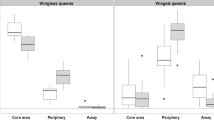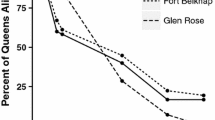Summary:
In the last few years, the proximate causes of invasion success in Argentine ants have attracted a lot of interest from behavioral ecologists. Hee et al. (2000) recently showed that small-sized propagules (i.e. queens with as few as 10 workers) can grow quickly, providing insights into the minimum requirements for the establishment of incipient colonies. Here, I stress two complementary factors of the Argentine ant's reproductive strategy that further help explain its success at establishing new populations: (1) the continuous presence of haploid eggs and the ability to produce male and female sexuals throughout the year, and (2) the replacement of mated queens due to intranidal mating. These attributes are important because they make the presence of queens unnecessary for successful propagule establishment in new areas.
Similar content being viewed by others
Author information
Authors and Affiliations
Additional information
Received 27 July 2000; revised 9 October 2000; accepted 11 October 2000.
Rights and permissions
About this article
Cite this article
Aron, S. Reproductive strategy: an essential component in the success of incipient colonies of the invasive Argentine ant. Insectes soc. 48, 25–27 (2001). https://doi.org/10.1007/PL00001740
Issue Date:
DOI: https://doi.org/10.1007/PL00001740




